
“I don’t deserve this success.”
“I’m just lucky.”
“There are other people better than me. I’m not skilled enough.”
Do all of the above sound like you, whenever something good happens? Now, if the answer is yes, that’s could actually be your imposter syndrome talking.
While it can feel more like being humble and down-to-earth, the truth is that it’s literally what this condition is all about.
From the Merriam-Webster dictionary, this is defined as “…a false and sometimes crippling belief that one’s successes are the product of luck or fraud, rather than skill.” Essentially, someone with imposter syndrome will feel like their accomplishments happen merely because of good fortune.
Some say it could be caused by being brought up in families who place a higher value on achievements. Coupled with the societal pressure to achieve, excel, and stay modest, it can strain individuals as they evaluate their self-worth based on what they’ve achieved.
Imposter syndrome can affect anyone regardless of their level of education, expertise, or even social status. At work, it’s especially prevalent among high performers and the process of imposter thoughts is known as an ‘imposter cycle’ (see diagram below).
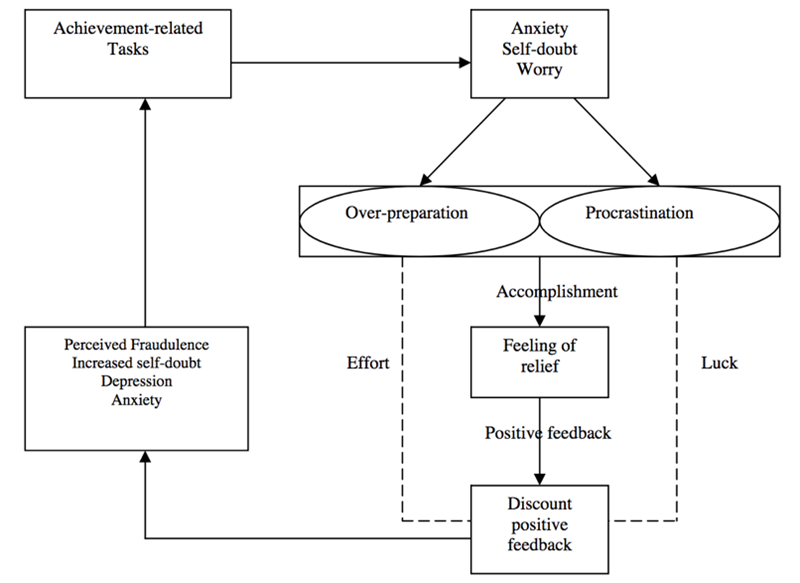
When given an achievement-related task, an individual with imposter syndrome may face anxiety, self-doubt, and worry. This leads to that person becoming over-prepared, or start procrastinating.
Once the task is completed, naturally, it is followed by relief and positive feedback. However, the individual may feel that all this is only due to either high effort (over-preparation) or sheer luck (procrastination). This discounts the positive feedback, causing the person to feel perceived fraudulence, increased self-doubt, depression, and anxiety.
If not managed properly, imposter syndrome can lead to self-sabotage and feelings of low self-worthiness, not just at work, but in their personal lives too. Studies report that at least 70% of people have experienced imposter syndrome at least once in their career.
It may seem like it’s a never-ending spiral of ‘get task > get lucky > get job done > get imposter syndrome > rinse and repeat’. However, we’re here to tell you that this can actually be managed, and it all starts with you! Here’s the little steps that you can do to start managing this sort of thought process better:

List down your experiences, skills, the problems you have solved, and the projects you have led. These are the fruits of your labour and something you accomplished yourself. And, get this, these are all real, unlike the fantasy impression of being an imposter!
The main takeaway of this activity is to be aware of your own goals and achievements without any comparison. This way, you’ll be able to take a step back and see for yourself what makes you special, and ask the person in the mirror, “Are you really an imposter?”

It’s actually quite alright to feel depressed, anxious, insecure, confused, frustrated, or even angry at yourself. Emotions are what makes us human, and keeps us continually evolving. Permit yourself to acknowledge them and the space to own them.
When this happens, write down how you feel so you can reflect on how it affects you emotionally. This exercise helps you identify signs of imposter syndrome so you can tackle it better in the long run.

Reframing the negative messages we tell ourselves to positive ones rewrites our mindset and outlook. Not only does it make us feel better, but we become more mindful of our thoughts and narratives.
Instead of “It only happened because of luck,” or “Other people are better than me,” turn it into words of positive affirmation like “I put in a lot of effort,” or “I am better than merely ‘good enough’.”

When we compare, we don’t just create feelings of inadequacy and low self-esteem. We actually end up perceiving ourselves as constantly being lesser than everyone else, and never good enough.
Instead of inducing self-sabotage, the only comparison you should make is between you and yourself, and outdo your own successes. Everyone is running their race, and remember, nobody is your toughest competition but you!

Without a strong support network, all the effort of instilling positive mindfulness and determination can crumble easily. Surround yourself with people who can uplift, reassure, motivate, and provide support – whether they’re your immediate teammates, industry acquaintances, or a new club you’ve begun.
A simple little exercise that you can carry out is to ask yourself how you might best encourage your support network who keeps downplaying their accomplishments, and then applying that same supportive language on your ownself!
If overcoming imposter syndrome sounds challenging and frightening, you’re not alone. After all, celebrities like David Bowie, Serena Williams, Tina Fey, Natalie Portman, Emma Watson, Tom Hanks, and Maya Angelou have once confessed to feeling like a fraud before!
That question sounds like it’s quite the ridiculous thing to ask, but remember, every cloud has a silver lining (if you look hard enough)! Imposter syndrome is exhausting to tackle, but can be beneficial, if managed appropriately and with the proper coping mechanics.

As it commonly affects high achievers, working with an imposter (or two) means you’re part of a highly-intelligent, driven team. It also indicates that you’re constantly challenging yourself – by exploring beyond your comfort zone and pursuing growth.
Feelings of being an imposter can be confused with humility and respect, but that’s actually a good thing. It keeps your self-confidence in check and prevents feelings of superiority or ego. Hence, you are less likely to take opportunities or new experiences for granted.
Your interpersonal performance at work may also improve, thanks to imposter syndrome. When employees feel their level of competence is lower than what others think, they are encouraged to prove themselves interpersonally by helping and cheering others on.
Imposter feelings are mainly driven by emotions and opinions rather than objectivity. When you eliminate the former two and consider all the concrete data in your hands, you realise that your achievements are warranted and purposeful.
Learning to embrace imposter syndrome and using it to your advantage is a long journey. When in doubt, remember that your feelings are completely valid and go as you can, so long as you don’t stop.

If you work in a corporation, there’s a possibility that you hear your superiors talk about Six Sigma. In statistics, this term means the least chance of errors or defects in the manufacturing process. While its somewhat related in the business world, Six Sigma is actually more than that. More importantly, it could help you ascend the corporate ladder and increase your salary. If this has piqued your interest, read on!
Six Sigma certification is the process of attaining industry-recognised certifications that declare an individual has competent knowledge and skills in using this method. Apart from being a process improvement methodology, this is also a set of management tools and techniques that focuses on catering to clients’ needs, on top of boosting a company’s earnings. This involves developing sustainable business strategies that raise efficiency, while also launching services and products that would not only better satisfy customers, but would also likely see strong market demand.
Motorola engineer Bill Smith is regarded as the ‘Father of Six Sigma’, along with statistician and co-founder Mikel Harry. They are credited for having first introduced Six Sigma to the corporate world, starting with Motorola in 1987. The system was quickly embraced by bluechip American businesses.

Among Six Sigma’s other early adopters were Honeywell and General Electric (GE). Back in 1995, when Jack Welch was GE’s Chief Executive, he made Six Sigma a major component of his business strategy. Then in 1998, the household appliance maker revealed that it had saved US$350 million thanks to Six Sigma, and the figure later surged to over US$1 billion. This astounding success helped spread the adoption of this methodology.
By the late 1990s, roughly 66% of the member companies of Fortune 500 had started utilising Six Sigma to slash business costs, as well as enhancing the quality of their products and services. Eventually, Motorola and GE crafted certification programs as part of their adoption of the methodology. Thereafter, many companies in the 1990s began offering Six Sigma certifications to their staff.
The time-tested set of tools and techniques is not only vital to a professional, but is also crucial to companies and businesses. At a glance, the table below shows the perks of Six Sigma:
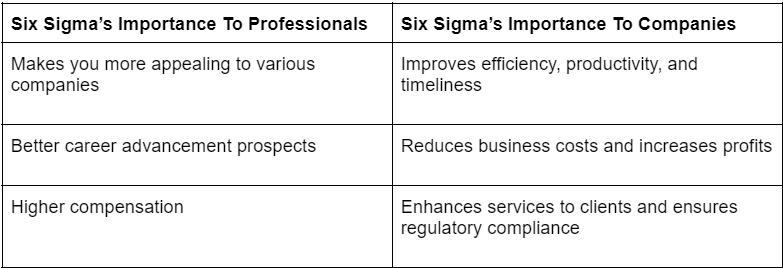
One of the top personal perks of attaining Six Sigma certification is that it makes you more coveted by businesses. So, in case the company you’re currently working for closes, you can easily be recruited by another firm. This is because certified professionals are highly sought-after by companies across different industries, as the methodology can be applied in any sector, be it finance, engineering, marketing, manufacturing, information technology (IT), human resources (HR), and many more.
Certified professionals are top talents wanted by companies, as such persons are adept in lots of different methods that can be used to improve business processes, cut expenses, and boost revenue. Apart from being an expert in assessing and measuring both qualitative and quantitative benefits of implementing any Six Sigma projects in a company, certified professionals have risk assessment and financial management skills that are usually requirements for mid- to high-level managerial positions.
Given that certified professionals are highly coveted by companies and businesses, it’s not surprising that such individuals are among the world’s highest-paid professionals. As a matter of fact, data from SalaryExplorer shows that average wages of people who hold a Six Sigma Black Belt in Malaysia range from RM4,250 per month to RM13,500 per month.

Applying Six Sigma not only boosts efficiency and productivity, but it also allows companies to meet their commitments on time. For example, Allen Medical took advantage of this methodology to enhance the production rate of arm boards, which are used on surgery tables. Thanks to Six Sigma, they reduced the time spent making each arm board by 45 seconds on average, and increased the number of arm boards manufactured per hour, to more than 6 from 5.3 previously.
By letting practitioners understand the different categories of waste and how it can be brought down, Six Sigma has been proven to help companies slash wastage and reduce unnecessary expenses. In fact, utilising Six Sigma helped Motorola save a whopping US$17 billion in 2005. By assisting companies in slashing expenses, such as the cost of high employee turnover, Six Sigma can help businesses improve their margins and increase their earnings.
Leveraging Six Sigma can enable companies to offer superior products and better services. This reduces the incidence of defects and unhappy customers. For example, Citibank was able to greatly increase customer satisfaction thanks to it.
Given that this methodology has very exacting standards, many vendors, procurers, and government agencies apply Six Sigma standards when assessing if a product or service passes their benchmarks. As such, applying this makes it easier for businesses to pass audits, such as those conducted by the International Organization for Standardization (ISO), as well as inspections carried out by government watchdogs.
Just like martial arts such as Judo, Karate, and Aikido, Six Sigma Certification uses a belt ranking system to show a person’s proficiency in using this methodology. In ascending order, these are White Belt, Yellow Belt, Green Belt, and Black Belt.
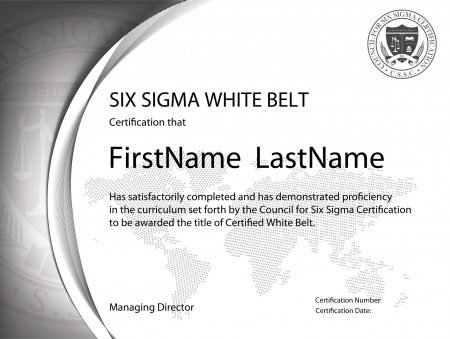
This is the basic level of Six Sigma certification. This requires applicants to know its fundamental concepts, including DMAIC, which stands for Define, Measure, Analyse, Improve, and Control. White Belt holders are expected to be able to assist in projects and problem-solving assignments related to quality, as well as improve management.
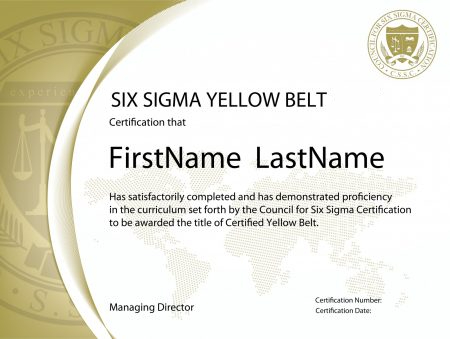
While this is recommended for entry-level staff, to obtain this rank you need more in-depth knowledge of Six Sigma and its tools, as well as learn to be a data-driven problem solver. As a Yellow Belt, you’re expected to be able to practically apply graphical techniques utilising statistical software, in addition to mastering over 40 Lean and Six Sigma Yellow Belt tools and techniques. You’re also expected to be proficient in creating a Six Sigma project storyboard, as well as start using root-cause analysis techniques like Fishbone Diagram, 5 Whys, and Brainstorming.
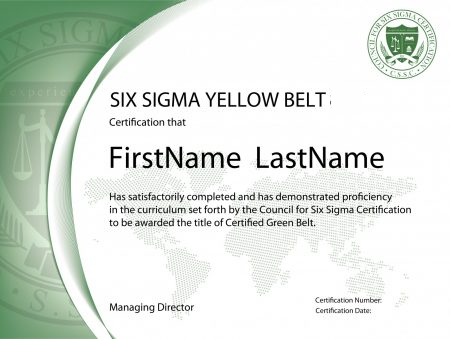
A holder of the Green Belt is someone who is highly skilled in the core to advanced elements of Six Sigma methodology, and they can easily solve actual business-related problems using the techniques. He/she is a professional who can already lead improvement projects, as well as serve as a team member of a more complicated improvement project that is led by a Certified Black Belt.
Before obtaining the Green Belt certification via the American Society for Quality (ASQ), you need to have at least 3 years of industry experience in one or more areas of Six Sigma Green Belt. Unlike the ASQ or the International Association for Six Sigma Certification (IASSC), the Council for Six Sigma Certification (CSSC) offers certification in two ways – namely the basic Six Sigma Green Belt certification, and Level 2 Green Belt Credential for the specialists who want to further hone their skills within this rank.
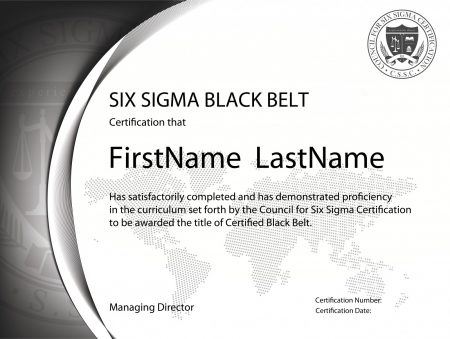
This is the highest rank, with Six Sigma Black Belt holders regarded as specialists and top innovators. Such professionals are proficient in helming project teams and overseeing Yellow and Green Belt members of the team. They have high responsibility and accountability as they manage the whole process lifecycle. Furthermore, the Black Belt holders can act as principal consultants to Six Sigma projects, and are regarded as top talents by companies.
The ASQ has the most stringent requirements for taking the exam for the Black Belt certification, as compared to other groups. With the ASQ, applicants are required to have completed two Six Sigma projects with an attached signed affirmation, or have finished one project with three years of industry experience with an attached signed affirmation. The IASSC has no prerequisites for the exam, likewise for CSSC. But the latter’s Black Belt certification comes in three different levels – Basic, Level 2, and Level 3.
Once an individual has received their Black Belt certification, they are qualified to take their exam for the Master Black Belt credential. ASQ and CSSC both have unique requirements for applicants to complete before they can take the exam. Meanwhile, the IASSC does not offer the Master Black Belt Certification.

While Six Sigma focuses on mitigating variance in the manufacturing process and enhancing process output by adopting a problem-solving approach leveraging on statistical measurements, Lean Six Sigma’s priority lies in reducing errors, defects, and wastage, on top of improving the operational workflow.
By themselves, they have limitations. For instance, Six Sigma can reduce errors and defects but it doesn’t tackle the problem of optimising workflow, whereas Lean Six Sigma doesn’t utilise advanced statistical techniques to expedite and streamline business operations or the manufacturing process. Given that each approach can already result in significant improvements, integrating both methodologies can lead to far greater benefits.
Earning Six Sigma certification is no easy feat. It requires dedication and hard work, especially if you’re aiming for a Yellow Belt credential or a higher rank. The exams are gruelling, and ascending from one belt level to a higher rank entails years of hard work and studying.
While being industrious can help, we advise applicants to access comprehensive resource materials and knowledge databases on this methodology, so they can pass the certification with flying colours.
In the end, your hard work will be worth it as Six Sigma-certified individuals are among the highest-paid professionals in the world. They are also so highly sought after to the point that rival companies usually attempt to acquire such talents by providing enticing offers so that the professionals will consider switching sides from competitors.

In this era of digital technology, the need for protection is essential to avoid scams, cyberattacks, malware, and more. Cybersecurity has always been in constant development to combat these digital attacks; and we should arm ourselves with the necessary certifications to ensure we’re on top of our game.
This article aims to outline the basics of cybersecurity, and list the 5 must-have cyber security certifications to have. First off, there are two main categories, which will be briefly explained below:
These are for professionals working in the field to get trained on some of the latest tools and software to detect, prevent, and combat against cyber threats. Think of them as training certifications for new or updated security certifications.
These certifications are to aid students in the cybersecurity field as well as shed light on the current and foreseeable problems, solutions, and innovations which will give them a head start into their careers. Most students who create a portfolio with academic certifications tend to get ‘reserved’ for work, even before graduating!
Some companies use particular products, and so they might require their professional cybersecurity staff to be certified accordingly. Examples of professional certifications include:

Most aspiring professionals would start by obtaining the relevant academic requirements. Most cyber security vacancies require a four-year Bachelor’s Degree in Computer Science or Information Technology.
One should start their career from there, as well as pick up a few academic cyber security certifications to bolster their chances of getting a job as soon as they graduate. Increasingly, associate’s and bachelor’s cybersecurity programs are offering professional certification preparation as part of the course load.
For example, Hossein Sarrafzadeh, a professor of cybersecurity and department chair of the cybersecurity department at Saint Bonaventure University, had this to say during a recent expert interview with Cybersecurity Guide:
“We’ve embedded a lot of industry certification materials into our curriculum…Students are encouraged to pursue industry certification, and get industry certified while doing their academic work.”

The right industry cybersecurity certifications will open up doors in a plethora of fields such as banks, network providers, schools and universities, airlines, security consultancy firms, and almost any large organisation or corporation with a database.
The aforementioned industry certifications serve as an indicator to potential employers that one is capable to fulfil the various roles and responsibilities related to the vacancy. Some of the duties which a cybersecurity professional would be tasked with include:
There’s a vast multitude of cybersecurity certification courses available to prospective cybersecurity professionals, and it can quite quickly become overwhelming to anyone just looking to get started in the field! But fret not, we have compiled a list of our top 5 suggested cybersecurity certification must-haves.

This may sound like a job straight out of ‘Mission Impossible’, but we can assure you that it’s a very real profession with a very real demand worldwide! As implied in the title, this certification essentially teaches one to think and act like a hacker, with the goal of teaching hacking techniques such as identifying vulnerabilities and weak points, as well as initiating actions to prevent, correct, and protect the system from potential illegal hacking threats.
Other skills include scanning networks, viruses and worms, session hijacking, penetration testing, trojans and backdoors, SQL injection, evading firewalls, and cryptography. This certification is mainly beneficial to security professionals, site administrators, auditors and anyone in the network security sphere.
You can sign up for Certified Ethical Hacking (CEH) certification here.

While this is still an entry-level certification, it does require five years of work experience before one can obtain it and is best suited for professionals who prefer a more hand-on security role. Among the many technical skills associated with the GIAC Security Essentials certification include identifying and preventing wireless attacks, access controls, authentication, DNS, cryptography fundamentals, critical public infrastructure, network mapping and network protocols.
Holders of the GIAC Security Essentials certification are required to renew their certification every four years as to ensure the aforementioned skills are still intact and, more importantly, up to date and keeping up with the advances of technology and security threats.
You can sign up for GIAC Security Essentials certification here.

CISM is among the top credentials for cybersecurity professionals in organisation security practice development. With credibility also comes the catch of having five years of cybersecurity experience before being eligible for the certification. However, one can also use a combination of education and experience as a substitute for this requirement. CISM covers security risk management, program development and management, governance, incident management and response, among other skills.
Much like the previous certification, CISM is valid for 3 years and holders have to pay an annual maintenance fee for the certification.
You can sign up for Certified Information Security Manager certification here.
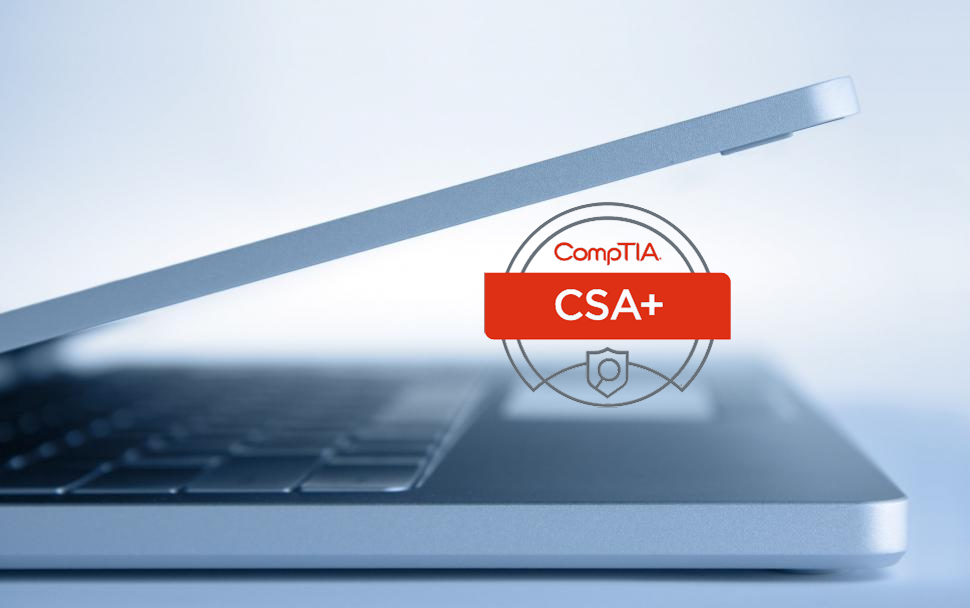
Comp TIA Security+ is a general level certification and is a minimum requirement and preference of the cybersecurity industry. It takes two years to complete the certification and is a must-have for those interested in having a career in the cybersecurity field.
Some of the skills covered in Comp TIA Security+ include network threats and defense techniques, effective security policies, network and host-based security practices, disaster recovery, encryption standards and products.
You can sign up for Comp TIA Security+ here.

Similar to Comp TIA Security+, many organisations and corporations consider Certified Information Systems Security Professional (CISSP) to be an essential requirement in the field of cybersecurity. Skills covered in Certified Information Systems Security Professional (CISSP) include access control, cryptography, telecommunications, networking.
Three to five years of prior cybersecurity experience is required to obtain this certification, but once completed, it serves as one of the best knowledge assets to have in cybersecurity.
You can sign up for Certified Information Systems Security Professional (CISSP) here.
Choosing the right certification can be tricky, but a good rule of thumb is to decide beforehand the kind of industry one wants to work in as well as one’s existing skillset. While all these certifications will almost certainly expand one’s current skillset, it is also important to select a certification in which one’s established skills can be utilised and further improved upon.
Another consideration should also be one’s own personal interest in the various aspects of cybersecurity as it can act as a guide to the right certification for each individual.
Most cybersecurity professionals work regular office hours, five days a week.
Entry-level cybersecurity professionals earn around S$27k a year, while senior cybersecurity professionals earn up to S$335k a year.
There’s currently not enough supply to match this demand for such a wide range of cybersecurity staff in Singapore. According to a study by CyberSecurity Ventures, there will be a deficit of 3.5 million cyber security professionals in the world and with Singapore already reporting a shortage of cyber security talents.
With the easy access to education and certifications the good pay and work culture, and the demand from organisations, the answer is a resounding YES! Cybersecurity would be an excellent career field to pursue for many individuals.
The certifications recommended above are a great way to expand one’s abilities and qualifications, but it goes without saying that if an individual wants to become of the best cybersecurity professionals in the field, these five certifications are a must have. They should serve as a stepping stone for further development in the field of cybersecurity.
Much like how technology is rapidly improving every single moment, the potential cybersecurity threats are also evolving just as quickly. Therefore, to be an elite cybersecurity professional, one must constantly be improving their existing skillset in order to be able to protect against all manner of digital attacks.

Getting a call back for an interview is only the first step before securing a job. And it’s always best to have answers prepared, instead of arriving at your potentially new office and winging it.
Simply put, your mission during an interview is to show you’re the right fit for the vacancy. More often than not, you can be expected to face the question of “Why do you want to work here?”, or some other version of it. The answer to that can make or break an interview, or at least, influence the course of said interview.
It’s especially crucial that you come up with a response that will exude confidence and credibility; convincing the hiring manager that you’re the right one for the job.
So, what does an interviewer hope to achieve by asking you that? Basically, he/she wants to know these few things:
Apart from these, the hiring manager would also consider your added value to the company, and whether you filling the position could potentially solve the existing problems. You have to craft an answer that can fully satisfy the above issues mentioned.
Below are some sample responses that will give the interviewer confidence in you, and make the follow-up questions smoother.

“I’ve been inspired by your company’s brand, style, and tone for years now. I want to be a part of this business as it grows, and I know my experience in product development would help your company reach new heights.”
This response highlights your personal interest in the company, and explains the motivation for applying. Conveying your experience to the interviewer also highlights your compatibility with the position applied, as well as the company work culture.
“As a fresh graduate, I need a platform to start my career. I’ve looked up the company profile and a relative/friend of mine working in your company told me this company encourages fresh talent and provides good work culture. If given the position and opportunity, I will do my best to be an effective and efficient employee to the company. I believe this is the place where I will be able to grow and develop, both personally and professionally.”
This response would be for fresh graduates hoping to lock in a new job. It highlights that you’ve done the necessary ‘homework’ as well as give the interviewer assurance that you would perform well in any roles and tasks assigned.
“I have used your products consistently for many years, and always been very satisfied with the innovations and user-friendly systems for customers understand. With the high quality of your products, distributing them would be a privilege. I would greatly enjoy helping you to continue to innovate and to increase your product awareness.”
This response reveals the motivation of applying to the company based on the high quality of its products. Using this response can earn star points with interviewers as you can provide feedback on their product as well as your enthusiasm to market or sell the products. This in turn would entice interviewers to hire you.
“In the short while I’ve been at this place, I can already tell this is the type of environment where I would thrive. When you elaborated on the company fostering an independent work-life, I felt that – I’m looking for opportunities where I can be responsible over my work and exercise more autonomy. It’s important for me to partner with a company that encourages this and not strictly adhere to protocol. I truly believe I can perform at my peak working with this company and am looking forward to the tasks assigned to me”
This response conveys your individuality and highlights your strengths and potential work rate which are in parallel to the company’s requirements. The hiring manager would be impressed and confident in considering you for the role.
“I really believe in the value of teamwork and so when I saw a vacancy in your company, I had to make sure I sent my application in. I believe working with other people towards a common goal is a must-have in a company and I know that just being a team member will not only bring me work gratification, but will make me an essential work colleague as well.”
The response given above highlights the candidate as a solid team player and shows His or Her’s excitement in being a part of the company. The response is perfect for vacancies that require teamwork to achieve their goals.

When answering that all-important question, try to make sure these aren’t included in your response:

Tailoring a response that will earn you favourable points with the interviewer is something everyone should strive to do. The most important thing is to be your own. List out specific values or information that resonates with what you believe. Consider using one of these ‘smooth like butter’ lead-ins to start your answer:
These lead-in responses will put the interviewer in the right mood/mindset to consider you and will make the follow-up questions easier to tackle.
Follow up questions are basically requests for you to further elaborate on your answer to that all-important question. Again, make sure you’ve obtained and studied all the relevant knowledge about the company, keep confident; push the best version of yourself during that interview and believe in yourself!

Prospective hiring managers take merely seven seconds to decide whether to pass your job application on to the next round or put it into a heaping pile of ‘maybe’ candidates. It’s already difficult to secure a job in this economy, let alone fresh graduates with no experience. However, all hope is not lost. 53% of employers claim that including cover letters with a resume will provide fresh graduates a better chance at securing a job.
A cover letter, typically accompanied by an exceptional resume, is basically a formal letter written in a professional tone. The purpose of the letter is to get prospective employers to have a better look at your skills and achievements and recognise your potential.
If written effectively, your carefully structured cover letters would help you grease the wheels to securing an interview session, and leave a strong, lasting impression. Doing so will help you stand out from a sea of candidates and hopefully get you through the next round of interviews.
Here’s a quick overview of the sections that we’ll be covering in this guide:

When it comes to fresh graduates, applying for a job is the ultimate challenge. The reality is, we’ve all been there, it’s just a matter of presenting yourself well. The key is to prepare for what’s coming, and adapt to the challenges.
Let’s look at the most common difficulties faced by fresh graduates and how to conquer them:
You must think it’s absurd for a fresh graduate to be expected to possess some working experience. Here’s the trick: Internships or a part-time job could help you fill that experience gap! How you performed at your workplace of choice sets the tone for your career. This shows your potential employers that you could manage a real-world setting.
Most fresh graduates make the mistake of ‘winging it’ when it comes to interviews. The reason such a session is even being held is to see if you could be a good fit for the role. So, do yourself a favour and nail those commonly asked interview questions (which you can read and prepare for in advance, you’re welcome!).
Hard or technical skills could be learned and trained, such as proficiency in a foreign language. Soft skills, however, are essentially your personal traits, for example critical thinking and teamwork. This is important for hiring managers as it serves as a rough indicator to determine the success rate of their company’s new hire.

Here’s some good news for you though: Some companies prefer hiring fresh graduates, provided that you have the potential for the role. This is because they’re considered a ‘blank canvas’, making it easier for them to be trained and acclimatised to the company culture.
Thus, it’s essential for you to create a great first impression during your initial interaction when applying for jobs. The first step is: Writing an outstanding cover letter.
First and foremost, you need to place this section at the top of your letter. It should consist of your contact information and the address of the company you’re applying to. Not only does it provide an organised structure, but it also makes it easier for employers to spot your contact details when they are interested in setting up an interview with you.
Here’s how your letterhead should look like:
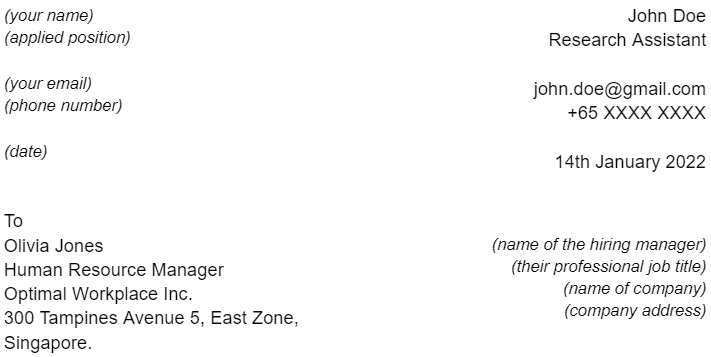
Time to write a killer opening statement! But, do remember to use the proper salutation to address the hiring manager:
Write a compelling but brief introduction on your tertiary education. Then, explain why you’d be the ideal candidate for the job position:
Juice your letter with relevant skills, by mentioning your qualities as well as experience, and elaborate how these could benefit the company. You could mention any volunteer work, extra credit assignments, or other roles that are closely related to the position throughout your study.
Sell yourself by highlighting your achievements; it’s okay to be a little bit extra and create an impressive list of what you have achieved throughout your years of dedicated study!
Add a powerful final closing statement so that you finish strong. Write a realistic promise statement on how you could add value to the company. Add a complimentary close along with your name and signature at the bottom.
Remember to:
Now that you know what to write, let’s check out what NOT to write.
1) Including your personal links on your cover letter
2) Focusing on previous job/internship responsibilities instead of achievements
3) Discussing your salary expectations
Read more: How to negotiate starting salary when you’re a new graduate
We’ve covered the cover letters. Now it’s time to polish your resume so you’d be an even more ideal candidate!

The best format for a fresh graduate is functional or skills-based. Adopting this into your resume enables you to highlight your abilities and skills, rather than your experiences. Here’s a quick run through:
Here’s a tip for you!
Identify the key skills that employers have listed on their job ad. Then match those skills into your resume summary or objective. This would make you an ideal candidate for the specific role!
Unless you’ve accomplished a close to 4.0 GPA, skip listing it on your resume. Also, avoid including high school diplomas since it’s no longer relevant. Follow this structure accordingly:
If you really want to stand out, consider removing your internship or relevant responsibilities, and replacing them with achievements at work instead. Simply use a power verb whenever possible such as “Accomplished, successfully, and/or effectively’. This will make you a more desirable candidate.

1) Customise each cover letter for different job applications
2) Use a professional font that is clear and legible
3) Rename and save your files properly with your nameHiring managers receive hundreds and thousands of job applications daily. If you don’t rename your file properly, it may be difficult for them to track your files.
4) Be honest on everything that you mention about yourself
Almost always, your employers would run a background search on you and will definitely find out if you ever deceive them on your job application

Fully utilising this extensive guide will provide you with a better chance at winning a sweet spot at your dream job. Remember to bring something extra to the table, such as a unique skill set, volunteering work and courses or certifications. Doing this will make you stand out among the other candidates.
Here’s are the summarised infographics you can easily refer to when writing cover letters or revamping your resume:
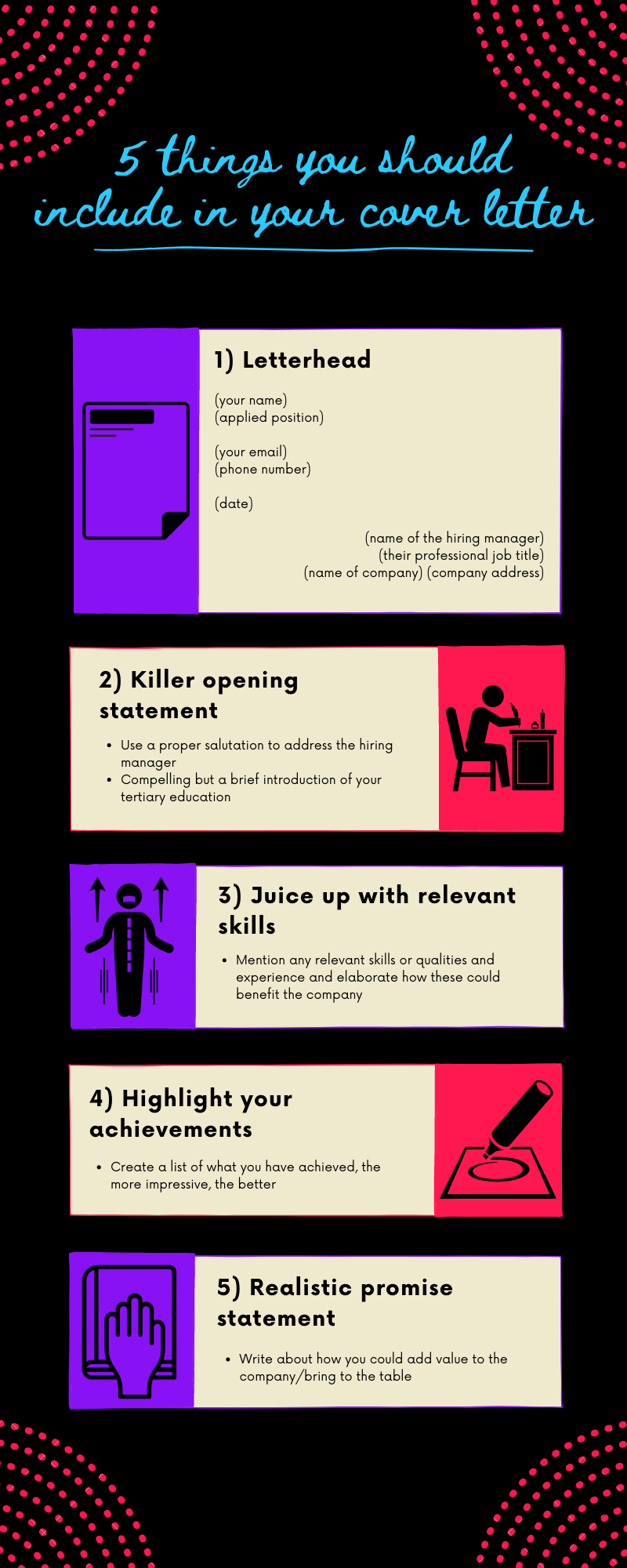
Extra notes:
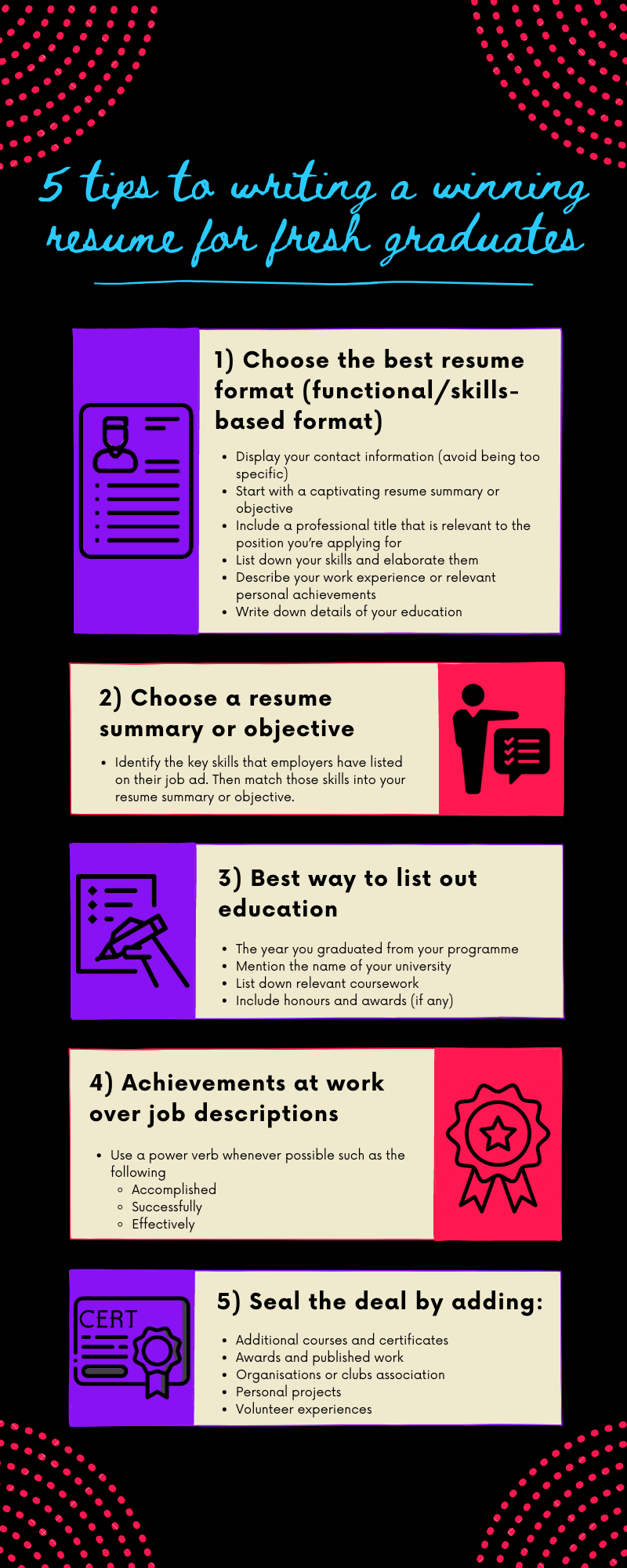
Final tips:
All the best, and may you get that job you’ve always dreamed of!

Work getting you down? We’ve all been there, and it’s only human to be disheartened and demotivated with work-life every once in a while. While building a career is extremely important, so is prioritising mental health as it can directly influence how we analyse and perform.
And nowadays, when our career is always at the top of our concerns, paying attention to our mental health is integral to keep up our productivity in the office. Furthermore, mental health plays a huge role in our ability to organise and pursue personal accomplishments through a stressful week of work.
If you’ve been feeling out of sync with your work lately, there’s nothing to feel ashamed about! Keeping up with everyday work (on top of personal obligations) can be stressful, and it’s quite normal to be grumpy about it. As long as you’re able to get your groove back, a short period of work-life blues is normal. To help you with the process, here are some essential tips to help you motivate yourself to resume working.
Workloads can often be daunting, and without proper organisation, they can add to your plight. Proper management can help you free up time to commit to your work, and also accomplish your tasks with precision. To make your workload more manageable, you can start by creating a routine for your day that allows you to designate sufficient time required to get each task done, without compromising on taking some time to breathe.
You can squeeze in a short breather in between work to relieve some stress from grinding for long hours. Not only does it allow you a change of pace, but it also lends you a fresher perspective before resuming work. From getting a refreshing drink to having a quick chat with your colleagues, this short break can be utilised for indulging in anything but work!
Some tasks can be too overwhelming to start with. However, breaking your task into smaller steps can be helpful in maintaining stability, and getting your work done on time. This method also lets you approach the task through smaller, attainable goals which can be easily accomplished. Not only does this boost your confidence, but it also reduces the chances of making any critical error. Don’t forget to celebrate each time you complete a mini task!
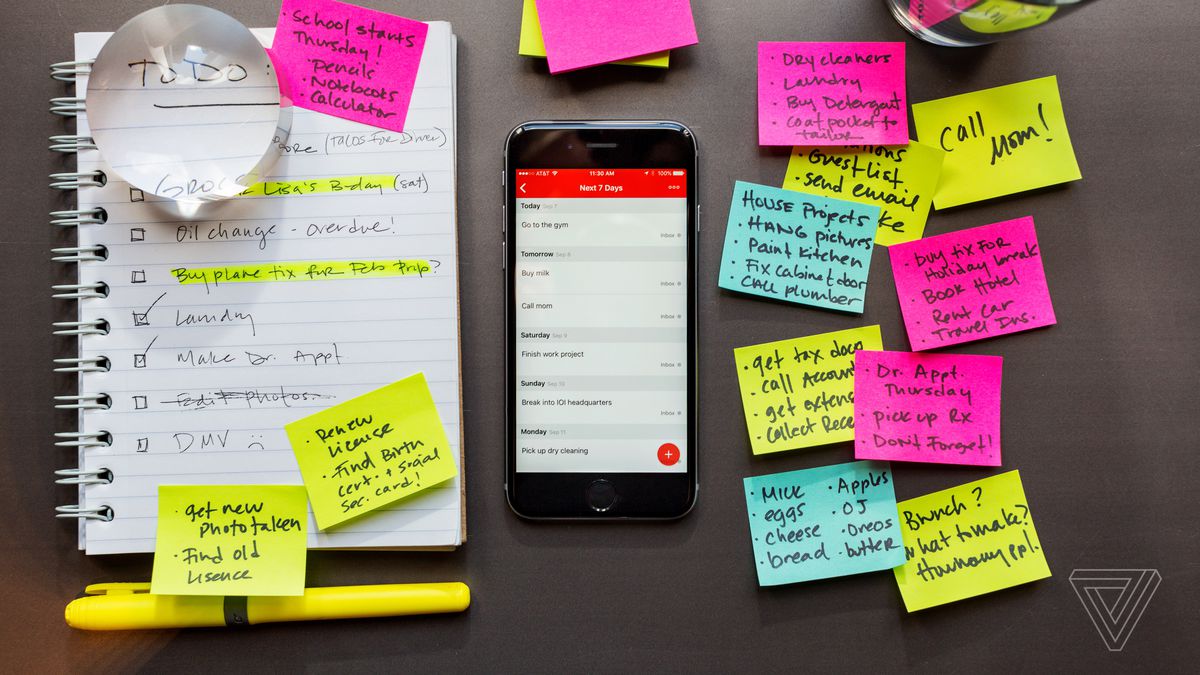
Stressful work-life can tire you out quickly. Therefore, to be able to work optimally, you must first take care of yourself. This includes good eating habits, proper hydration, and sufficient rest. When it comes to your eating habits, you must have a well-balanced diet consisting of adequate protein and green, leafy vegetables. It’s also beneficial to cut down on your intake of caffeine and complex sugars, such as those contained in soda and candies.
Like food, sufficient rest also plays an effective role in keeping your body and mind in sound condition. As an adult, an individual requires 7-9 hours of sleep to be able to function. Other than looking after your body, you should also pay attention to yourself by taking care of your mind, by listening to relaxing music or doing a quick meditation session.
With a hectic schedule and everyday stress, it’s often easy to lose track of your accomplishments. To be able to remotivate yourself, it’s important to take into consideration your personal progress and see how far you’ve come. Being able to go through your accomplishments gives you a sense of relief and helps you come out of a slump.
Working through the week without taking care of yourself too, can often prove difficult and morose. As the days go by, keeping up your productivity can prove to be challenging. However, these motivational quotes might just be the thing you need to survive the blues of ticking off that to-do list.

After a short weekend, returning to work on a Monday can be pretty rough. But it’s also important to start off your week on a good, productive note. With these uplifting quotes from the best thinkers, here’s to wishing you a delightful day:

Moving on to Tuesday, it’s important to keep up the good work and the momentum going. Though it can be easier said than done, with these motivational quotes on hand, you can prepare for anything that comes your way:
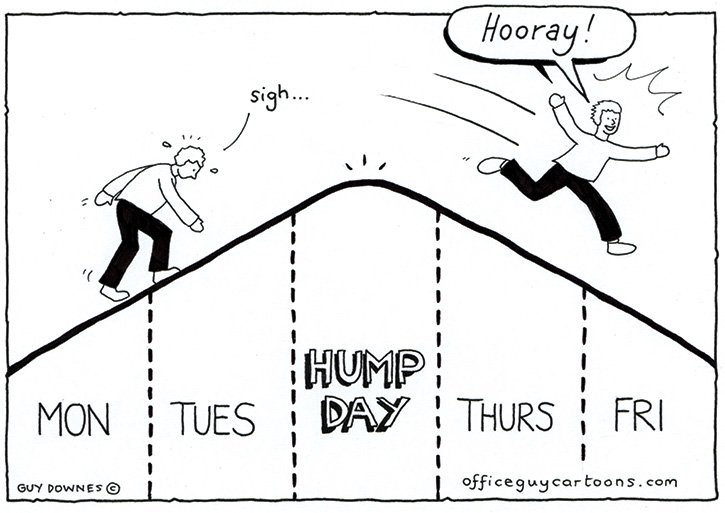
With Wednesday setting in, you’re already halfway to the weekend, look at you go! You would want to keep up that streak of productivity with these inspiring quotes:
Trivia time: Did you know that Wednesday, being the middle of the work week, came to be known as ‘hump day’? It signifies that it’s the final “hump” to be cleared in order to coast into the weekend!

Just a bit more, and you’ll be through with another week of work. With your unyielding focus and efforts, getting all your work done should be a piece of cake on Thursday. Here are a few encouraging quotes to reflect your unabated energy:

As Friday rolls in, you’re almost done with another busy week of work and accomplishing personal goals. Having passed successfully, let these heartening quotes accompany you through the last working day:
And that’s how you survive another week, getting closer to your goals with each step. And now that the weekend is here, you can relax and reflect on how far you’ve progressed with these quotes:
Work is important, but so are you! And it’s okay to not have to be tough all the time. With these motivational quotes, give yourself that much-needed boost of self-confidence to get through a stressful week.
Just think of it this way, every grey cloud has a silver lining and everything passes. This shall also pass and bring forth a time that will be for unwinding and relaxing. So, buckle up and prepare for another productive week ahead!

A manager is generally understood as the person who is the administrative head of a firm, and responsible for controlling and directing the organisation. A business can have several departmental managers, and there’s also a manager who shoulders the responsibility of looking after the whole business.
In a corporate framework, the managerial position is vital because it involves performing crucial roles like planning, staffing, organising, and directing the business. These roles need to be achieved in order to ensure the company functions smoothly.
A firm can appoint more than one manager for different posts and responsibilities. Generally, there are three sets of managers who control and administer the other employees. This hierarchy is split between the top-level manager, mid-level manager, and customer service manager:
They oversee the operations of a firm as a whole. The roles of the top-level managers include improving the efficiency of the business, and increasing profit every year. They’re also responsible for the supervision of company matters including budget overviewing, employing marketing strategies, and managing staff members.
They’re the functional heads of the business, and their responsibilities include handling different teams, negotiating with other team managers to streamline various processes, and accomplishing the company’s goals. The mid-level manager also approves the final steps during the project management plan development. They often manage and assist the problems related to team member performance to bring about improvements in the department’s functioning.
They’re commonly in charge of the daily activities of an organisation that involves communicating and liaising with customers. The services of the customer service managers aren’t just limited to handling customers; rather, they’re also responsible for connecting and communicating with relevant teams to solve any and all issues, thus ensuring customer loyalty and improving the brand image of the company.
Though Michael Scott from The Office made it look so easy breezy, being in the position of the managerial head requires some special skills. As shown below, these skills are usually dependent on the abilities and attributes that an executive must have to run the firm efficiently.

Running a business efficiently demands quick-witted technical skills. These involve boosting sales, designing different programmes and services for both the customers and the employees, as well as marketing products. Many companies prioritise technical skills when it comes to recruiting someone for the managerial post.
Furthermore, these also include improving the engagement among employees. Being a role model and setting the right goals for the employees so that they can achieve a variety of objectives, are some of the fundamental roles of a manager. For a manager, technical skills are a key help for company analyses related to product endorsements, buying and selling stocks, and more.
These are fundamental for a management role since it helps in identifying and solving intricate issues within the organisation. They play an important role as they allow the company to run optimally without any hindrances, and overcome a myriad of perplexing issues.
This type is very important from the managerial perspective, as they can use their conceptual skills to better understand their employees and come up with unique ideas to work together, thus bringing out the best in them. Managers are often required to deal with multiple complex crises where conceptualising skills make sure these problems can be resolved effectively and creatively.
Having this helps managers to understand and sympathise with their employees. In the workplace, human interpersonal skills involve communicating, listening, and appreciating employees. Managers play an impactful role in leading and inspiring employees to work productively,hence why these are considered valuable.
Though interpersonal skills mostly depend on an individual’s personality, they can also be acquired and cultivated through consistent interactions with other people. When working with a team, interpersonal skills help generate camaraderie among employees, and maintain a positive and solution-oriented attitude in the business.
Leadership skills are key to appointing an individual as the manager. An ideal manager is expected to boost workplace morale, improve productivity, and help subordinates to accomplish their professional goals.
Having leadership goals help managers to create a vision, and lead employees towards it. He/she will also be able to create a safer work environment, on whom employees can fall back on to discuss and effectively resolve issues.
Running a business requires time and finite resources that need to be utilised and managed with precision. To be able to do so, the manager needs to be more attentive towards their time management skills.
This is especially crucial for managers who have been tasked with several responsibilities, to be able to handle a lot of work at once and assess the duties within a short period of time.

A good manager whom everyone looks up to must inculcate the following qualities:
An individual aspiring to be in a managerial post has to be able to effectively converse with customers and subordinates alike. Being able to articulate impactfully and convey valuable information through regular conversations is essential for the manager to keep the company working smoothly.
A business cannot operate on its own. To keep up productivity and accomplish goals, the manager must be equipped with team-building abilities. Though not always easy, team building is a must-have quality for managerial posts to ensure that the team maintains good rapport and functions well.
As a manager, you’ll need to make important business decisions. Sometimes the decision-making process can prove to be difficult, but with critical thinking and creative reasoning, managers can effectively figure out the best solutions during a crisis.
There are no set pieces of training that can help you ascend the managerial ladder in a company. The training required would depend on the kind of industry you’re working in, the type of work required in the firm, as well as identifying the skills you lack that you need to improve on.
For example, if you’re working in information technology, you need to have the core domain knowledge to get promoted to the managerial level. You also need to train in the different latest technological innovations so that you can prove to be an invaluable asset to any company. Not to mention, you also need the above-mentioned skills such as decision making, leadership, and communication.

There are bad managers and good managers, and then there are great managers. To be a great manager you need to involve yourself in the business completely, understand your responsibilities, resolve queries of the employees, handle customers quickly and tactfully, and overall contribute towards the improvement of the company. Simply ordering your employees about, and imposing a hierarchy, can never make you a great manager.
It might be easy to become one, but difficult to keep up with the responsibilities. You’ll have a lot of tasks to work on, and you need to ensure the improvement of your company. As long as you are adequately devoted to your work and have great interpersonal skills, ascending to a managerial position should be a walk in the park for you.
A new manager must be equipped with skills like organising, leadership quality, and the ability to deal with changes. It’s also important to be well associated with the employees and build a peaceful relationship between them.
You can apply for a managerial post after completing a bachelors or a master’s degree in business or accounting. However, depending on the responsibilities, different departments can require different educational qualifications.
Managing a business requires a lot of tireless work and dedication. If you think you have all the skills mentioned above, or you can develop them, a managerial position could be the right place for you. You’ll always have a space to showcase your talent, quality, and growth.
It’s very important to grow individually along with your business, and both the growths might overlap in many beneficial ways. If you have leadership qualities and great interpersonal skills, you can definitely consider a career as a manager in a prestigious company.

The concept of internships is to allow anyone who lacks the working experience to get hands-on knowledge in a particular field. Employers nowadays emphasise on hiring candidates that demonstrate a good work portfolio or resume, regardless of whether it’s an internship, actual job experience, or even volunteer work.
An internship is considered an official programme provided by organisations or companies to provide real-life work experience, especially for students or fresh graduates. In exchange for being a worker for a specific time in a company, interns are promised to be taught skills that are essential to their career.
So, why is an internship so valuable? Simply put: You’ll gain real-world exposure! In today’s job market, your CGPA or examination grades just aren’t good enough to land you a job. The real-life exposure will help you acquire the desired knowledge and skills to move forward in your career.
An internship also allows you to establish your professional network connections, as a vast connection even before you even graduate is a huge stepping stone. It enables you to have more job opportunities, and in case your contacts aren’t able to provide you with a job, they can write you a good referral letter!
Having first-hand experience in your industry is important when it comes to landing your first job. However, that’s only if your potential employer gave you a chance to talk about yourself in an interview. And to get that, you’ll need a professionally written internship report.
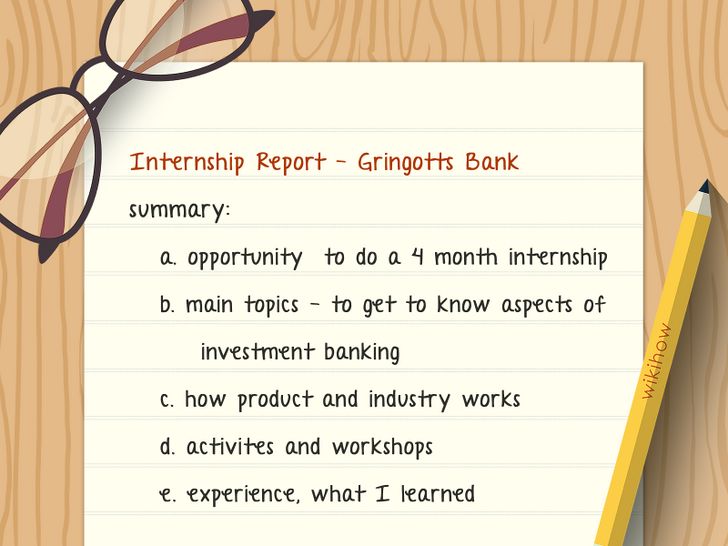
Think of an internship report like your diary, except that it’s professionally written. In this report, you’re to summarise your working experience as an intern, and the skills you’ve acquired. It will have all the relevant details regarding how you apply those skills, what tasks you’ve completed, and the general responsibilities that you have in that company as its intern.
So, why exactly would the potential employer want your internship report? That’s because having it will allow them to know if your experience is needed, or aligns with what they’re looking for in a candidate.
And besides, having this can still be helpful for your own personal evaluation to improve yourself better! We’ve already listed down all the necessary steps and a template for you, keep reading to find out.
The key point of your internship report is to cover most of the details regarding your working experience. This, of course, includes the soft and hard skills you’ve developed along the way.
And although we’ve provided you with a general step-by-step format, do note that there might be different instructions on how you should write your report, depending on the preference of the company.
The general creation process of your internship report is as below:

The first impression is always important. We believe you’ve heard of this phrase more than once in your life. And you’ve guessed it! The function of the title page is to give a good first impression on whoever is reading your report and separate you from other candidates who might be submitting theirs at the same time. This is why it’s crucial for you to include your name, which university you’re from, the name of the company you’re working or have worked with, as well as a brief introduction on who you are.
It’ll also be helpful for the employers or hiring manager if you include a table of contents after the title page. Since you’ll be having a lot of information written, having a handy list of all the headers and sub-headers in your report allows readers to navigate to the page they’re most interested in reading.
Every internship comes with learning objectives. You wouldn’t be going for one, unless there’s something you want to gain and acquire from that company. Hence, listing down the knowledge and skills will allow the employers/directors to know if you’ve accomplished your learning objectives upon finishing the internship.
It’ll be best if you include a relevant history regarding the company in your report. The information you write can include the date the company was founded, their purpose, vision, and mission statement, the industries they’re in, the type of tasks, products, services they do, and any other relevant details. These will allow your readers to understand better the responsibilities and experience you’ve had while working there.
Before discussing what you’ve learned and the skills you’ve acquired, it’s best if you guide your readers through the role and responsibilities you’ve had in that organisation. Understanding the overview of your internship makes it easier for them to have an idea of the challenges, tasks, and accomplishments that you’ve gotten in that internship.

Consider this as the main body of your report. Anyone who comes across your internship report will be looking at what you’ve learned, the problems and challenges you’ve solved, as well as the skills you’ve acquired along the way. In this section, you need to be descriptive regarding the specific things you’ve done, and relate all these experiences to your educational background. Provide a detailed explanation of how these skills are cultivated, and how the theories you’ve learned from your studies have helped overcome the issues you’ve faced while working.
Last but not least, it’s important to conclude your internship experience in a succinct manner. Try and keep your conclusion around 1-2 paragraphs to explain the essential skills and experience you’ve gained from a few of the major tasks you’ve completed. You should also include your opinion as well, such as what are the things you think you can do better, if there are any other ways to solve a particular problem, how you’d like to be more involved in a certain aspect of the business, etc.
Title page
[Name]
[Class]
[Internship dates]
[Internship company]
Table of contents
Company information
[Company name] was founded in [year] with the vision to [details of the vision]. The company’s mission is to [mission statement]. [Company name] plays an important role in the [name of the industry] industry. I chose to intern in this organisation because I want to contribute to their mission which is aligned and relevant to my career goals.
Internship description
My role at [Company name] was to [details of your job description]. I worked directly with the [department] and [other relevant departments (if any)] in ensuring [internship responsibilities].
Overview of internship experience
During my internship with [Company name], I was able to experience working first-hand with [the tasks you’ve completed], and through that, I’m able to develop my [skills you’ve acquired]. I found out that my [experiences] are useful in solving issues related to [problems you’ve solved]. Although I am considered to be less experienced with [the tasks/issues you’ve faced], I’m able to solve the problems with the help of my team by [describing how you apply the skills you’ve acquired].
Outgoing consideration
While I’ve gained many experiences and skills at the [Company name], I feel that I’m still lacking the confidence to solve [tasks you wished you were better at doing]. If I’m allowed more time to learn and participate at the [the aspects of the job you wanted to join], I would be able to polish my skills more in solving the [tasks/issues you’ve faced].
In conclusion, [details].

The best part of being young is that you’re allowed to make mistakes and learn from them, and where’s a better place to enable you to learn by experiencing the tasks first-hand, other than your internship? This is why it’s essential for you to choose an internship that best suits your career goals!
Before we send you off to a lifetime of adventure ahead, here are a few tips for writing an effective internship report:
We wish you all the best in your future endeavours!

The Python certification is a kind of training course that helps you master the concepts of the programming language.
This type of certification lets your employer know that you’ve been through intense and in-depth learning, which in turn, allows them to provide you with an opportunity to work with a Python-related programme.
You might be thinking, ‘Why would an employer give a chance to someone with a Python certification, and not with an IT degree?” Well, that’s because you’ll be working on real-world projects and case studies as part of the overall certification courses!
It doesn’t matter if you’re from software engineering, web scraping and automation, web development, data science, or machine learning; you would know that the Python language is one of the most relevant and important languages in the programming industries.
Being one of the most functional programming languages, this is only second to JavaScript when it comes to popularity among all the coders. Due to its versatility and a vast set of frameworks that come with it, mastering this language will definitely help develop your programmer skill sets and land you high-paying jobs.

There are a few places where you can get this coveted certificate, namely, Microsoft and Python Institute. While most of us know just how big of a name Microsoft and its credentials are, let’s move on to Python Institute.
Aside from Microsoft, the Python Institute is probably one of the best places for you to get your certification. In collaboration with Pearson VUE, and set up by Open Education and Development Group (OpenEDG), they promise a range of courses and certifications that equip programmers with various skill sets and concepts regarding the language.
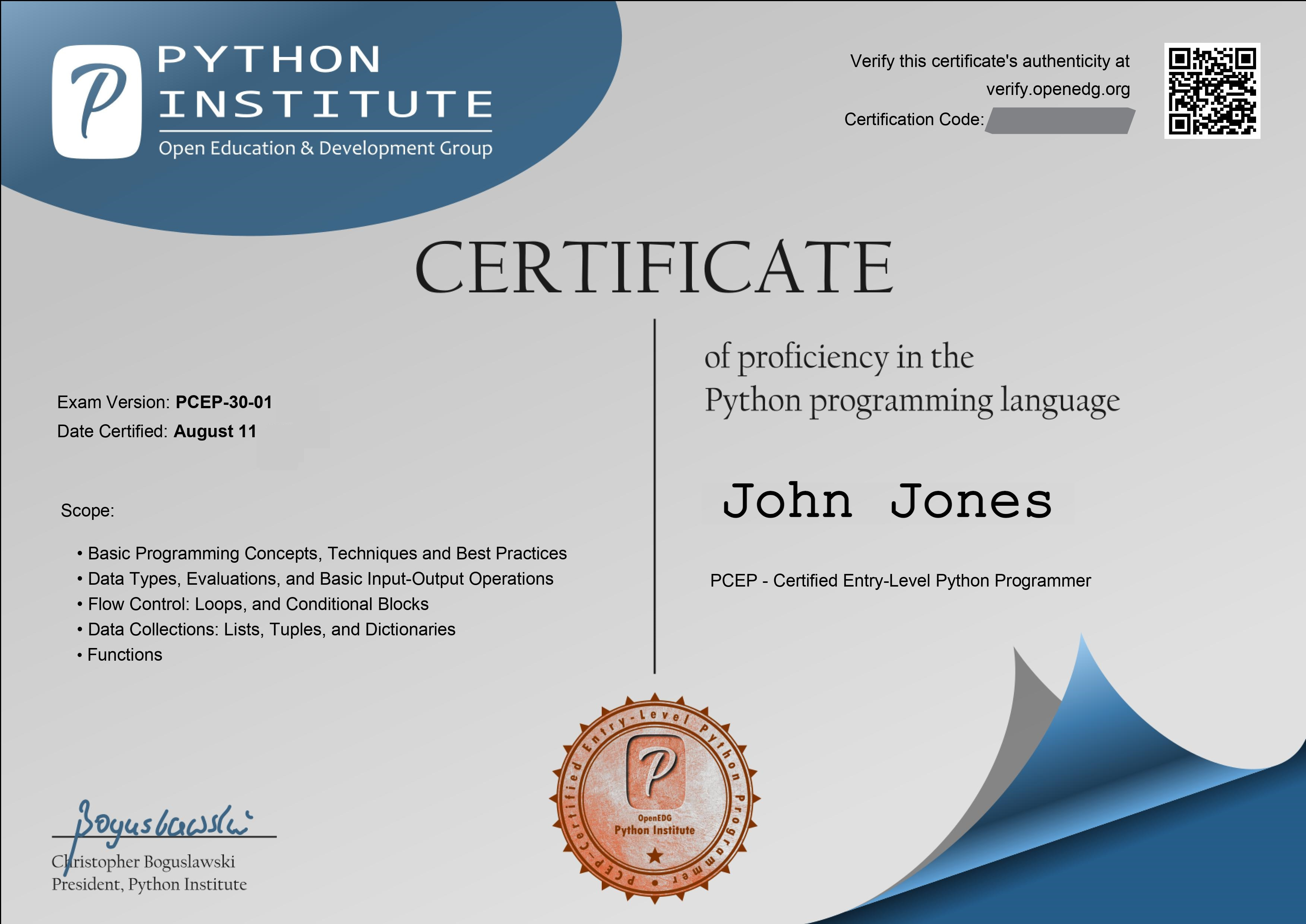
Think of PCEP certification as the first step to building your credentials! This entry-level course helps learners to gain all the fundamental knowledge one needs before proceeding to an intermediate level course.
The details of the exam are as below:
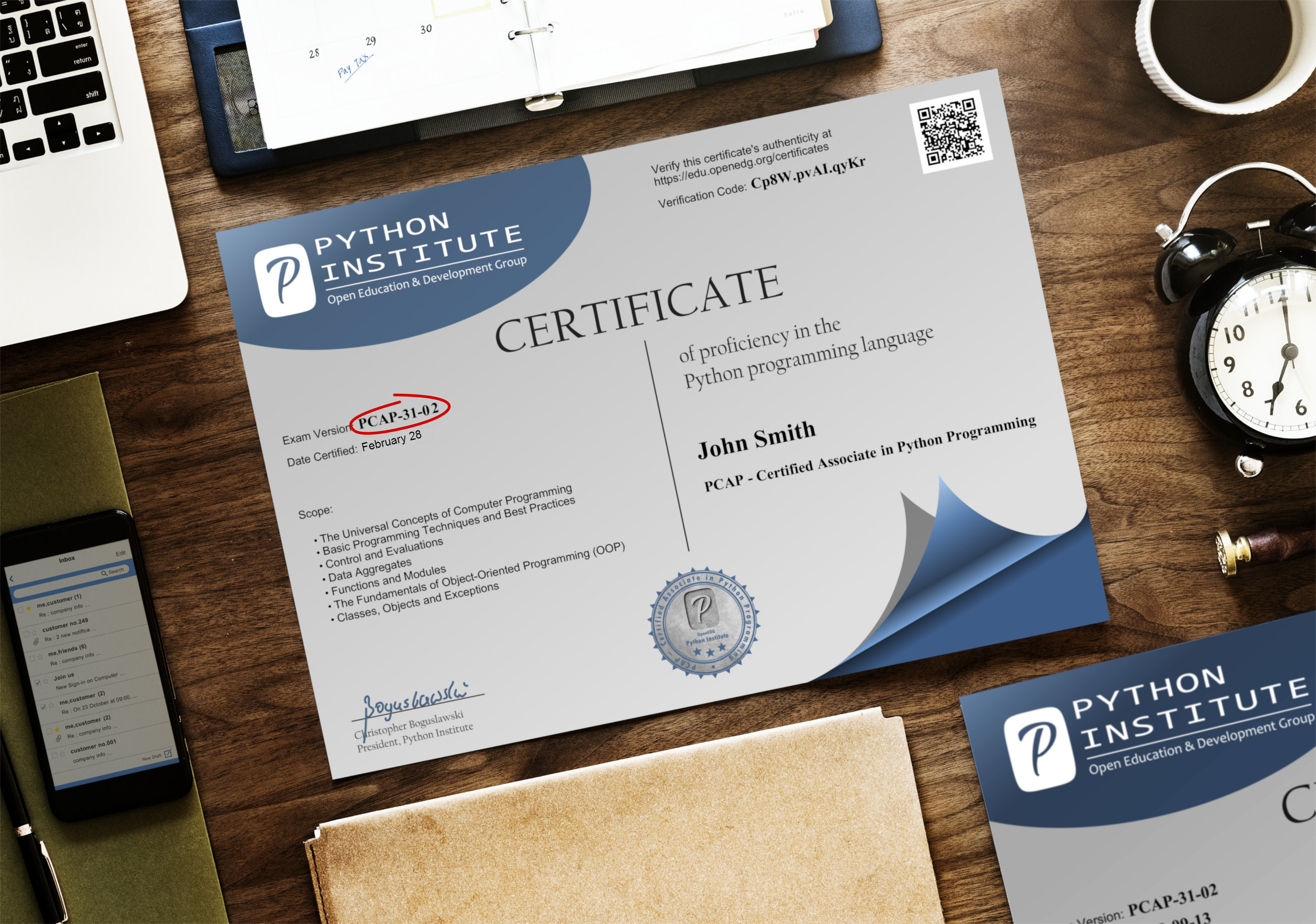
The PCAP certification helps learners to be familiarised with the Python language in general, before proceeding to an advanced programming course and being a competent coder/developer.
Following this course, candidates are able to build confidence in using the language, and help them understand the fundamental notions and techniques employed for object-oriented programming.
The details of the exam are as below:

The PCPP certification is considered the highest level course offered by the Python Institute. This certification is split into two, namely PCPP-1 and PCPP-2. As learners go through these courses, they’ll be able to accomplish programming tasks related to advanced-level coding using the Python language.
Upon completing PCPP1, the learner will be proven to have the credential equivalent of an advanced Python developer worldwide.
The details of the exam are as below:
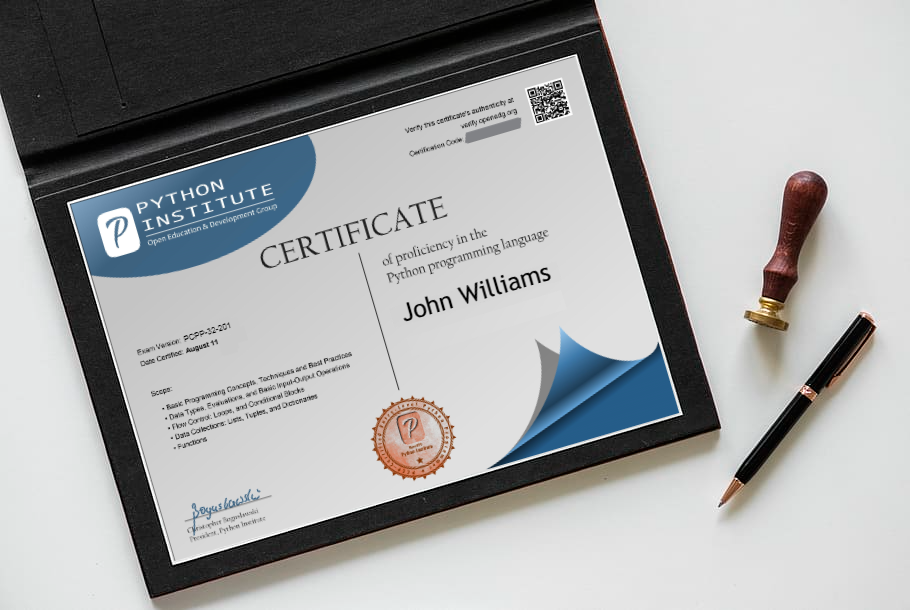
Individuals certified with a PCPP2 are considered to have acquired the highest level of expertise in the language and are recognised as professional programmers/developers.
With the credentials of a PCPP2 certificate, the candidates are expected to be able to automate processes using Python and create tools, systems, and frameworks using Python and related technologies.
The details of the exam are as below:
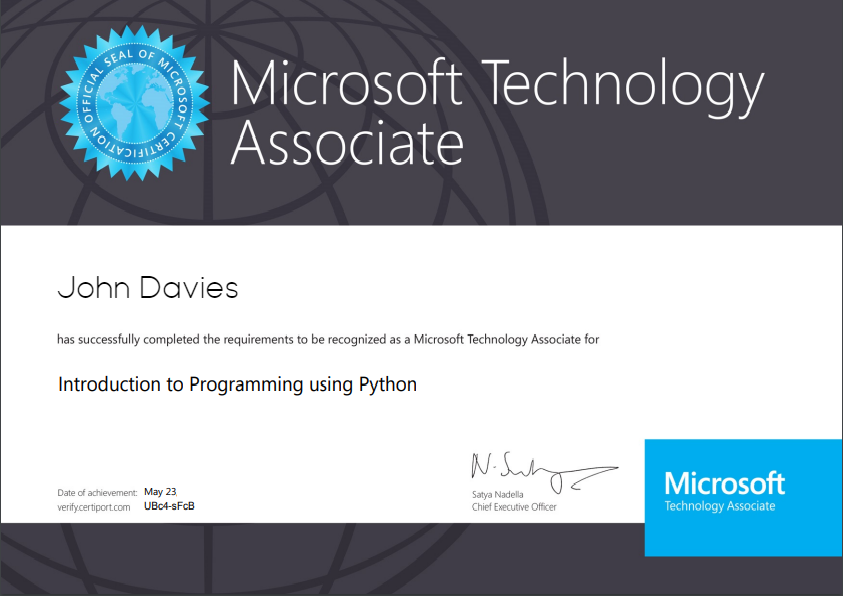
As suggested by the name, the Microsoft Python Certification Exam (also known as Microsoft Technology Associate 98-381: Introduction to Programming Using Python) is issued by one of the largest tech companies in the world. Upon the completion of this course, learners will also be awarded the Microsoft Technical Associate (MTA) credential.
The MTA 98-391 is recognised worldwide by professional programmers and companies, as the course covers the general purpose of Python programming language, and related technologies.
The details of the exam are as below:
Now that we’ve covered the available courses in full detail, we’ve compiled the key information into a handy table below for your easy reference too!
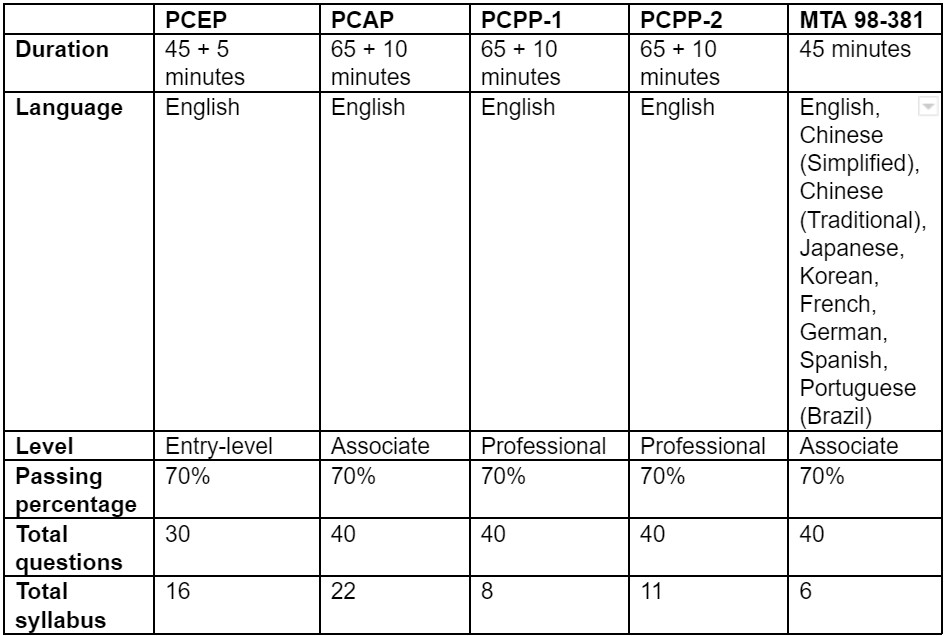
It doesn’t matter if you’re a novice, an associate, or even an expert in the field of programming; we understand that it can be nerve-wracking when we’re to sit for an examination. And that’s completely normal! Who wouldn’t be nervous to sit for a final?
No worries, we’re here to give you some tips and tricks. For starters, there are tonnes of books out there that are good for learning Python, even when you have no prior experience using the language, namely, ‘Starting Out with Python’, ‘Python for Everybody’, and ‘Learn Python the Hard Way’. And in case there’s any term that’s hard to understand, there’ll always be videos on YouTube to guide you through the problems.
There are also many practice tests online, where they prep you with the most important and hot questions for these Python certifications. Doing them is crucial because you’ll probably come across some similar ones, and you get to apply the concepts multiple times before going for the actual exam!
Having good credentials by owning the Python certificate is definitely crucial to becoming a successful programmer/developer. However, even though you’re now fluent in the language, it’s still important to have some experience in the related field.
This is why you should make use of your time and skills acquired from this certification to create a project portfolio. Showing what you’ve learned and how you applied these skills to a project will impress employers of your ability as a capable programmer/developer!

It can be difficult to understand specifically what the idea of ‘zen’ is. For some, it’s a feeling of peace and calm; for others, a minimalist life or even a destination that brings them happiness.
Truthfully, zen is none of the above scenarios.
The origin of zen lies within the concept of meditation, centering on a personal relationship between you and your mind. At its core, the art of zen is finally being able to come to peace with your thoughts, and the self-awareness of who you are in this universe.
At a basic level, zen is practised firstly by clearing your mind. Allow your thoughts to enter and leave, soar and fall organically, with no interaction or influence in any way.
As zen is rooted in meditation, applying it in the workplace can be a bit of a challenge. After all, the office is most often a fast-paced world of “go, go, go” and never “stop, pause, reflect”.
This can lead to imminent burnouts as we juggle the roles we’ve been assigned. Not forgetting, offices are most often not a conducive place to sit down quietly and meditate.
Despite that, there are several ways you can cultivate a higher level of mindfulness while still at work. It doesn’t have to involve getting out of your chair and setting up your yoga mat in a corner, but little things and practises to help you find peace in your thoughts and well-being.
By practising or honing a more zen-like state of mind (a.k.a. being mindful) in the office, there is better mental focus and attention channelled into what needs to be done. That includes being mindful of new information and differing points of view too.

Scents can help you calm your nerves and transition into a more peaceful state of mind. Certain scents like rosemary, peppermint, and citrus can even help you focus better as they contain properties that energise, uplift, open your breathing, and in some cases, are even anti-bacterial.
Depending on your preference, you can opt for anything from a soy wax air freshener (USD 9.81) to a state-of-the-art desktop diffuser (USD 99.00) to help you breathe and tap into zen while in the office.

If you find yourself losing attention quickly, the odds are it’s because of clutter all around you. A messy, unorganised environment can affect the way our brains work, resulting in procrastination, increased stress levels, and even poor eating habits.
The solution? Dispose of items that don’t spark joy. Start by organising your office stationery with IKEA’s TJENA desk organiser (USD 4.99), but if you need even more storage solutions, go big with this 5-tier mesh organiser (USD 39.59).

Now that you’ve disposed of things that don’t spark joy, you can welcome ones that create that in your heart. Practice the mantra of ‘less is more’ and choose simple, yet meaningful items that will keep you grounded and motivated at work.
It could be anything from small, simple, inspirational laptop stickers ($3.19) that will remind you to stay grounded, or even a blown-up poster of the peaceful ocean ($41.00) to remind you that this (whatever it may be), too, shall pass!

To reach a place of zen, sometimes it requires imaginative thinking. The imagery of a Japanese bamboo garden, a flowing stream of clear water, or perhaps an endless meadow below blue skies.
The one thing all these have in common is nature. By incorporating elements of nature into your workspace, like an adorable pack of mini succulents (USD 13.99) or a Monstera statement plant (USD141.00), greenery in the workplace has been proven to increase workplace happiness, and of course, the quality of indoor air.
Did you also know that having a number of plants by your working area has been proven to increase productivity by 15% (according to a study conducted in the UK and Netherlands)? All the more reason to go get those green thumbs moving!

When you need to get in touch with your inner goal-driven self, noise-cancelling earphones are a necessity to completely block out workplace chatter and idle noise so you can focus on yourself and on the now.
Take your pick of the audio buddy of your choice to accompany you, like these compact, noise-cancelling JBL earbuds (USD 99.95) or these sleek, wireless Sony earphones (USD 349.99).

Lyric-free music such as Beethoven’s Symphony 5, a Japanese bamboo water fountain, or even your favourite lo-fi playlist on Spotify can help improve our sense of learning, focus, and eliminate distracting background noise.
By plugging in your noise-cancelling earphones (or earbuds) and tuning into these soothing sounds, you’ll be able to clear your mind and boost efficient productivity at work. There are plenty of playlists on Spotify for focus that are completely free, or if you have a vintage vinyl player, check out Craig Kupka’s New Music for Relaxation ($21.98).

Related to the human body’s circadian rhythm, the presence of daylight or sources of natural light can enhance performance and moods at work. Remember: Blue/white lights make us energised, whereas red/amber lights increase melatonin secretion which improves mental health and leads to better sleep.
If your work desk is tucked away in the corner, far from natural light sources, you can still lift the mood with a multi-functional dimmable LED desk lamp with a built-in phone charger (USD27.99) or a minimalist lamp with gold accents (USD 129.60).

A healthy mind starts with a healthy diet! Despite the bad repertoire tidbits get, healthy snacks help improve brain functions, moods, and maintain your body’s sugar levels throughout the day.
Raisins and prunes are high-fibre treats and when mixed with nuts ($22.49) such as almonds, cashews, and walnuts, are a good source of healthy fat. For beverages, brew a hot cup of chamomile, lavender, or matcha to soothe your mood and mind, and indulge in a varie-tea pack of 8 flavours for just $17.99.
In the modern world, peace and mental health are just as important as physiological needs on the lowest rung of Maslow’s hierarchy. Depreciating mental health can impact work performance, productivity, communication, and even daily functions.
By creating a zen corner in your workplace, it represents a safe space for you to be at peace with yourself and your thoughts, accepting everything and yet, also nothing. Embracing and acting on the concept of ‘here and now’.
A zen workstation can contribute to higher productivity, lower stress levels, efficient time and energy management, and a strengthened focus to meet your end goals.
Needless to say, before you get your work in order, it’s time to get your surroundings in order. Namaste!